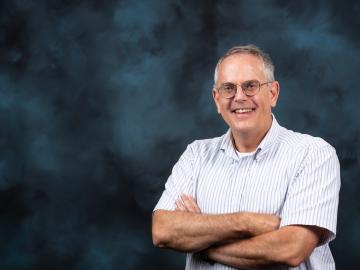
Filter News
Area of Research
- Advanced Manufacturing (6)
- Biology and Environment (52)
- Biology and Soft Matter (1)
- Computational Biology (1)
- Computer Science (2)
- Energy Science (99)
- Fuel Cycle Science and Technology (1)
- Fusion and Fission (33)
- Fusion Energy (5)
- Isotope Development and Production (1)
- Isotopes (6)
- Materials (80)
- Materials for Computing (9)
- National Security (26)
- Neutron Science (101)
- Nuclear Science and Technology (26)
- Quantum information Science (1)
- Sensors and Controls (1)
- Supercomputing (68)
News Type
News Topics
- (-) Advanced Reactors (24)
- (-) Artificial Intelligence (112)
- (-) Critical Materials (16)
- (-) Energy Storage (75)
- (-) Neutron Science (136)
- (-) Nuclear Energy (94)
- (-) Security (28)
- (-) Space Exploration (16)
- 3-D Printing/Advanced Manufacturing (105)
- Big Data (53)
- Bioenergy (93)
- Biology (106)
- Biomedical (59)
- Biotechnology (35)
- Buildings (45)
- Chemical Sciences (70)
- Clean Water (18)
- Composites (23)
- Computer Science (174)
- Coronavirus (36)
- Cybersecurity (31)
- Education (5)
- Element Discovery (1)
- Emergency (3)
- Environment (154)
- Exascale Computing (64)
- Fossil Energy (7)
- Frontier (60)
- Fusion (54)
- Grid (48)
- High-Performance Computing (113)
- Hydropower (6)
- Isotopes (53)
- ITER (6)
- Machine Learning (50)
- Materials (111)
- Materials Science (111)
- Mathematics (8)
- Mercury (9)
- Microelectronics (4)
- Microscopy (40)
- Molten Salt (5)
- Nanotechnology (46)
- National Security (78)
- Partnerships (67)
- Physics (60)
- Polymers (22)
- Quantum Computing (48)
- Quantum Science (79)
- Simulation (52)
- Software (1)
- Statistics (3)
- Summit (62)
- Transportation (56)
Media Contacts

Chuck Kessel was still in high school when he saw a scientist hold up a tiny vial of water and say, “This could fuel a house for a whole year.”

ORNL and three partnering institutions have received $4.2 million over three years to apply artificial intelligence to the advancement of complex systems in which human decision making could be enhanced via technology.

ORNL has added 10 virtual tours to its campus map, each with multiple views to show floor plans, rotating dollhouse views and 360-degree navigation. As a user travels through a map, pop-out informational windows deliver facts, videos, graphics and links to other related content.

To better understand how the novel coronavirus behaves and how it can be stopped, scientists have completed a three-dimensional map that reveals the location of every atom in an enzyme molecule critical to SARS-CoV-2 reproduction.

The Transformational Challenge Reactor, or TCR, a microreactor built using 3D printing and other new advanced technologies, could be operational by 2024.

Popular wisdom holds tall, fast-growing trees are best for biomass, but new research by two U.S. Department of Energy national laboratories reveals that is only part of the equation.

Two scientists with the Department of Energy’s Oak Ridge National Laboratory have been elected fellows of the American Physical Society.

Momentum Technologies Inc., a Dallas, Texas-based materials science company that is focused on extracting critical metals from electronic waste, has licensed an Oak Ridge National Laboratory process for recovering cobalt and other metals from spent

Geoffrey L. Greene, a professor at the University of Tennessee, Knoxville, who holds a joint appointment with ORNL, will be awarded the 2021 Tom Bonner Prize for Nuclear Physics from the American Physical Society.

Led by ORNL and the University of Tennessee, Knoxville, a study of a solar-energy material with a bright future revealed a way to slow phonons, the waves that transport heat.


